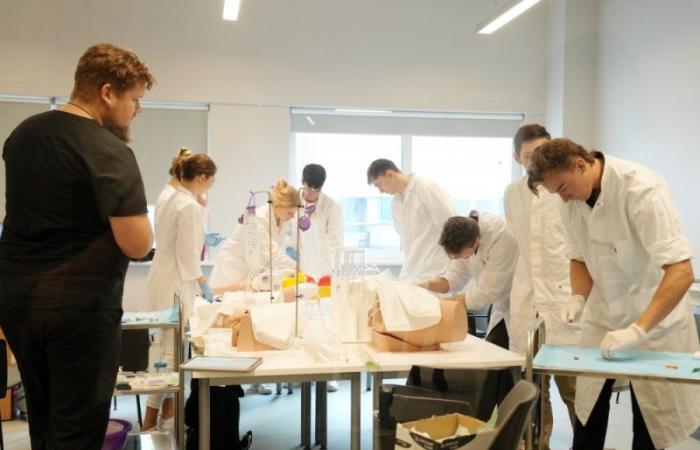
“Higher education is becoming modern. This means that being smart is modern,” said Jana Bunkus, head of the Communication Department of the business school “Turība”, in the TV24 program “Press Club”, discussing higher education in Latvia and the labor market.
Numerology and the magic of numbers: how your phone number affects your destiny and when to change it?
Skabeeva rants: Russian propagandists are outraged by Trump’s actions in connection with Ukraine
TV24
“It sounds like we’ve been having fun.” About injustice and allowances for those pensioners who worked during the Soviet era
Read other posts
Higher education is “on top” right now, and the trend continues to grow, Bunkus added. People have understood that if they have obtained higher education, then “there are more opportunities in life”. “We also asked our graduates about employment. Then the indicators that we have at our disposal, then 90% [studentu] working already during studies. The Ministry of Education also has a similar study, where it appears that this indicator is, in principle, very high. Those people who have a higher education have a higher employment rate, and the unemployment rate is lower among highly educated people,” emphasized Bunkus.
In addition, here also “the correlation appears” between the fact that higher education also means higher income, explained the head of the Communication Department of the Business School “Turība”.
“Summing all this together, the conclusion arises that higher education is currently such a necessity – such a package of professionals. What does higher education mean? This means a comprehensive vision in many areas. It’s nothing that I study communication, but I have to study philosophy at the same time, study both globalization and etiquette, artificial intelligence and so on. It is such a very versatile, wide way, when you get information that you wouldn’t get if we didn’t study. We would not open or read any additional resources,” admitted Bunkus in the TV24 program “Press Club”, discussing the role of higher education in the labor market.
It has already been announced that at the beginning of 2023, 42.7% of the 806,000 employed people aged 25 and over in the Latvian labor market had a higher education. This is an increase of 0.7 percentage points within a year, and by 1.5 percentage points within two years, according to the calculation of the Central Statistics Office, using the information available in administrative data sources.
According to the information on the Official Statistics portal on April 17 of this year, last year every fourth (24.5%) employee had a master’s degree, 13.9% a bachelor’s degree, 3.6% a college education and 0.7% a doctorate. . Secondary education was 37.1% of the employed. 13.5% of the employed had acquired vocational education after secondary education, primary school education – 6.4%, primary school education – 0.3%.
In 2023, almost half (45.1%) of employed people aged 25 and over were managers and specialists, more than a fifth (21.4%) were skilled workers and a fifth (20.0%) were office, service and sales workers . The least (12.7%) worked in simple professions.
The proportion of employees with higher education increased by 1.1 percentage points among specialists (60.0% in 2023, 58.9% in 2022), but decreased by 0.6 percentage points among managers (70.0% in 2023). in 2022, 70.6% in 2022) and senior specialists (86.4% in 2023, 87.0% in 2022).
The proportion of employees with higher education among office workers has not changed significantly – from 41.8% in 2022 to 41.9% in 2023.
The proportion of employees with higher education among qualified agricultural, forestry and fishery workers has increased by 1.5 percentage points (4.1% in 2023, 2.6% in 2022). The number of employees with higher education in the professions of the national armed forces increased by 0.3 percentage points (from 39.5% in 2022 to 39.8% in 2023) and in the professions of equipment and machine operators and product assemblers (from 8.9% to 9 .2 %).
The proportion of the population employed in simple professions with basic and lower education has decreased by 0.4 percentage points – from 16.3% in 2022 to 15.9% in 2023, while the proportion of employed persons with higher education in this group of professions has increased – from 10.6 % to 11.3 %.
Among the population aged 25-64 at the beginning of 2023, the highest employment rates were for persons with a doctorate degree – 91.9%, with a college education – 85.6%, with a master’s degree – 84.5% and with a bachelor’s degree – 82.7 %. The lowest employment rate in this age group (9.2%) was for persons with no or less than primary school education.
The reasons for not getting an education can be different – health problems or disability, personal or family circumstances. Among the population with primary school education, 36.7% were employed, with primary school education – 52.3%, with secondary education – 66.4%, and with professional education after secondary education – 72.0%.
After reaching the national retirement age (age 64 years and 3 months in 2022), a similar trend remains – more employed people are among those with higher education: 48.5% of those with a doctorate degree and 46.9% of those with a college education continue to work. 38.6% of employees with a bachelor’s degree and 29.2% with a master’s degree continue working after reaching retirement age.
Upon reaching the retirement age, the population with no or less than primary school education has a lower employment rate – 2.3%, with primary school education – 3.7%, with basic education – 9.0%, with secondary education – 18.8% and vocational education after secondary education – 22.0%. You can read more about the data collected by the Central Statistics Office HERE.
Themes
Tags: Higher education modern Jana Bunkus comments obtaining higher education necessity
-




